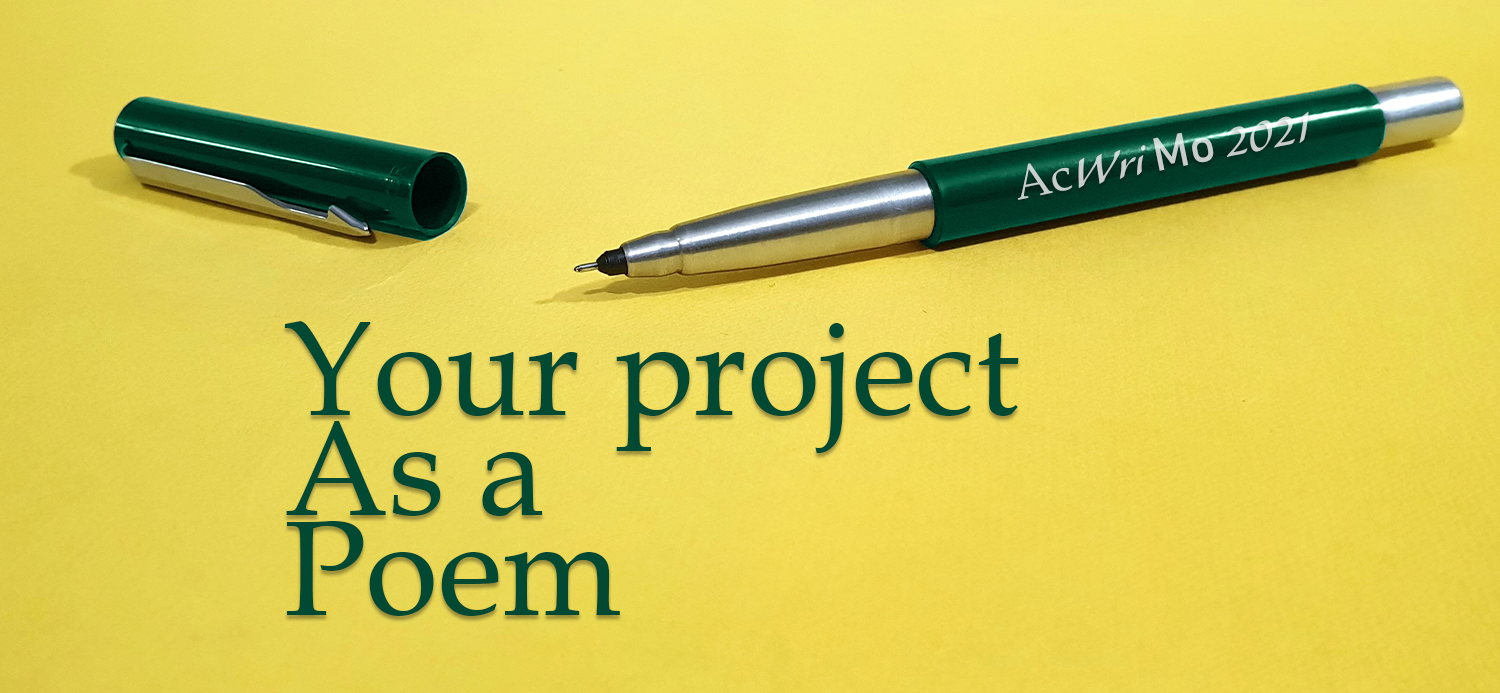
For AcWriMo, we invite you into a little competition and some unexpected perspectives: can you transform your doctoral thesis, journal article or research project into a poem?
We even have some prizes for the winners!
This can be a fun exercise, and a break from the hard work of theory, experiments, or analysis. You might also find some more substantial effects.
This is your chance and our challenge:
- Write a poem that describes or responds to your research. It can take any form you like, as long as it has a maximum of 40 lines. Any fixed form or free verse is welcome.
- Email your poem to doctoralcollege@surrey.ac.uk by Thursday 25th November with the subject heading “My project as a poem”. Please make sure the formatting is exactly as you want it.
- All poems are welcome, and we will share entries on our Twitter feed during AcWriMo. (Please only enter your poem if you are happy for us to share it, but of course we encourage you to have a go even if you don’t submit it. We reserve the right not to share poems that might be considered inappropriate.)
- At the end of AcWriMo, a judging panel will select the best poems. These will win the author a £10 book token (or equivalent), and special mention (with poem) on the next DC newsletter.
Make it new
‘Make it new’ was the rallying cry of imagist Ezra Pound, who saw it as poetry’s sacred obligation to see and express the world in an original way. Everyday language had become full of cliches and euphemisms, inadequate for describing the new realities of the twentieth century. His work tended to be highly compressed and unsettling images of ‘ordinary’ life, inspired by Chinese poetry that he spent many years translating. One of his most famous poems is just a single brief image, capturing at a stroke the anonymity of city life, at once dreary and hypnotic:
In a station of the Metro
The apparition of these faces in the crowd;
petals on a wet, black bough.
Think about what image might convey your research, or what everyday object could represent what you do to a non-specialist. Make it striking, provocative, new. You might like to see how the format of a haiku or a tanka (traditional Japanese forms) forces you to be concise and play around with conventions of grammar.
Not only might this give you some interesting new ways to talk about your work with other people, but it could be really handy next time you have to write a complex research statement in 150 words or less.
Wit, Wonder and Self-care
The therapeutic benefits of writing are well documented, from stress relief to enjoying your own creativity, sharing with others, and processing difficult experiences. Since research is also often a high-stress environment, writing can offer a bit of a safety valve, and a chance to get some distance from the demanding work you’re engaged in. Whether a poem helps you to find the lighter side of your challenges, to better understand yourself, or is just some light relief from the seriousness, we encourage you to give it a go; grant yourself permission for some ‘serious play’.
A limerick might be the perfect vehicle for wittily commenting on your project (or life as a researcher in general), or you might prefer this cynical four-liner from Omar Khayyam:
These fools have never burnt the midnight oil
In deep research, nor do they ever toil
To step beyond themselves, but dress them fine,
And plot of credit others to despoil.
Current Oxford Professor of Poetry Alice Oswald often talks about the spell-like quality of poems, which might be a way to grasp (or even change) an elusive aspect of the world. If you’ve got something you’d like to change about the world, or want to capture to wonders of your research – the things that other people might miss – why not write a poem as a dream, a prayer or even a curse. Even William Shakespeare wasn’t above writing a sonnet all about self-pity (and how even feeling terrible can have its pleasures and compensations):
Sonnet 29
When, in disgrace with fortune and men’s eyes,
I all alone beweep my outcast state,
And trouble deaf heaven with my bootless cries,
And look upon myself and curse my fate,
Wishing me like to one more rich in hope,
Featured like him, like him with friends possessed,
Desiring this man’s art and that man’s scope,
With what I most enjoy contented least;
Yet in these thoughts myself almost despising,
Haply I think on thee, and then my state,
(Like to the lark at break of day arising
From sullen earth) sings hymns at heaven’s gate;
For thy sweet love remembered such wealth brings
That then I scorn to change my state with kings.
For a more serious exploration, poetry can be reflective, confessional, or a rallying cry. The silent page might make it easier to be brutally honest, or to remember what is lost in the whirl of daily life. Find a still space, give yourself plenty of time, and write just for yourself. Confessional poets such as Sylvia Plath and Anne Sexton brought a raw and personal approach to their writing, using intense language to convey psychological experiences and the memories of traumatic events. Duduzile Ndlovu has written about how writing about her research became a kind of self-care, helping her to process her own past and ‘make sense of […] research outcomes’. She even discusses the use of poetry as a research tool, by involving participants in writing opportunities.
Are you tempted? Happy writing!
Dr Mike Rose, Researcher Development Training Officer, Doctoral College
